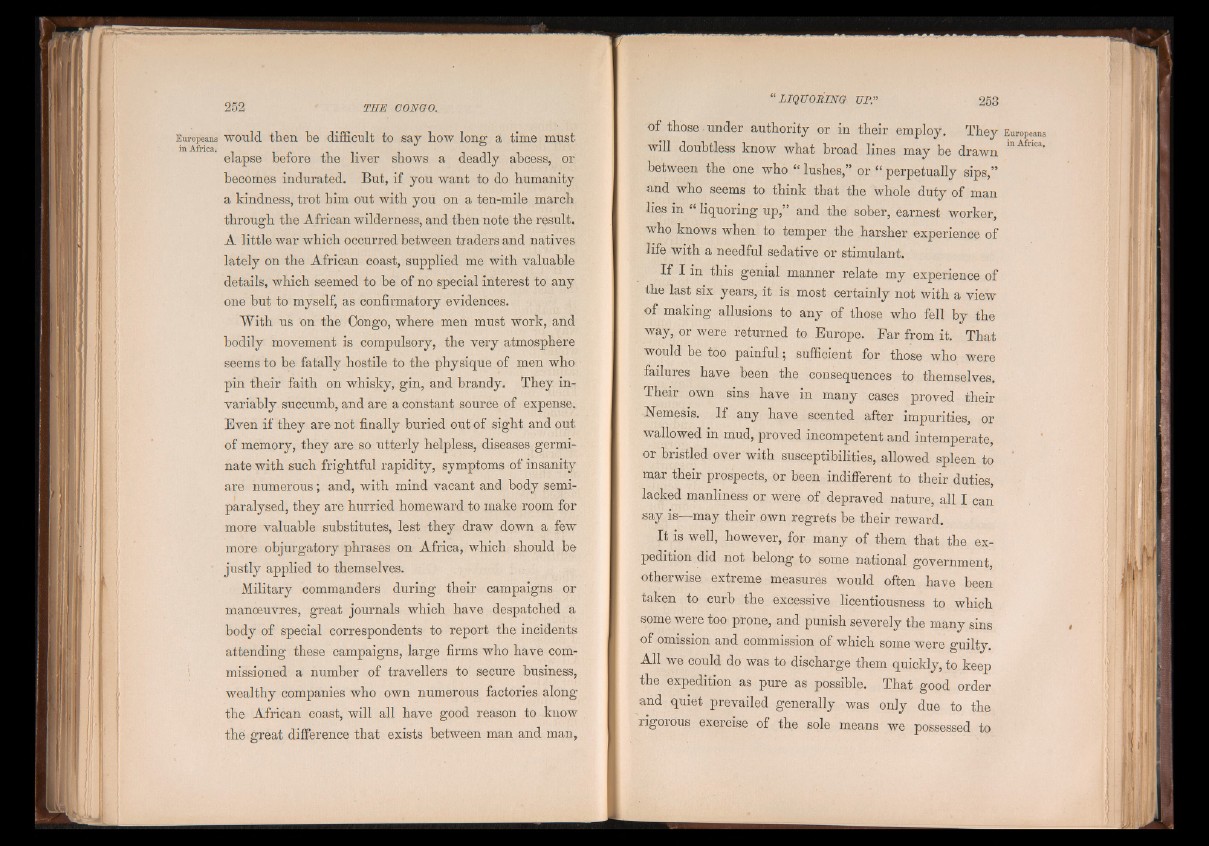
Europeans would then be difficult to say how long a time must
in Africa, elapse before the liver shows a deadly ahcess, or
becomes indurated. But, if you want to do humanity
a kindness, trot him out with you on a ten-mile march
through the African wilderness, and then note the result.
A little war which occurred between traders and natives
lately on the African coast, supplied me with valuable
details, which seemed to he of no special interest to any
one hut to myself, as confirmatory evidences.
With us on the Congo, where men must work, and
bodily movement is compulsory, the very atmosphere
seems to he fatally hostile to the physique of men who
pin their faith on whisky, gin, and brandy. They invariably
succumb, and are a constant source of expense.
Even if they are not finally buried out of sight and out
of memory, they are so utterly helpless, diseases germinate
with such frightful rapidity, symptoms of insanity
are numerous ; and, with mind vacant and body semiparalysed,
they are hurried homeward to make room for
more valuable substitutes, lest they draw down a few
more objurgatory phrases on Africa, which should be
justly applied to themselves.
Military commanders during their campaigns or
manoeuvres, great journals which have despatched a
body of special correspondents to report the incidents
attending these campaigns, large firms who have commissioned
a number of travellers to secure business,
wealthy companies who own numerous factories along
the African coast, will all have good reason to know
thé great difference that exists between man and man,
of those under authority or in their employ. They Europeans
will doubtless know what broad lines may be drawn iuAfrica'
between the one who “ lushes,” or <£ perpetually sips,”
and who seems to think that the whole duty of man
lies in I liquoring up,” and the sober, earnest worker,
who knows when to temper the harsher experience of
life with a needful sedative or stimulant.
If I in this genial manner relate my experience of
the last six years, it is most certainly not with a view
of making allusions to any of those who fell by the
way, or were returned to Europe. Far from it. That
would be too painful; sufficient for those who were
failures have been the consequences to themselves.
Their own sins have in many cases proved their
Eemesis. If any have scented after impurities, or
wallowed in mud, proved incompetent and intemperate,
or bristled over with susceptibilities, allowed spleen to
mar their prospects, or been indifferent to their duties,
lacked manliness or were of depraved nature, all I can
say is—may their own regrets be their reward.
It is well, however, for many of them that the expedition
did not belong to some national government,
otherwise extreme measures would often have been
taken to curb the excessive licentiousness to which
some were too prone, and punish severely the many sins
of omission and commission of which some were guilty.
All we could do was to discharge them quickly, to keep
the expedition as pure as possible. That good order
and quiet prevailed generally was only due to the
rigorous exercise of the sole means we possessed to